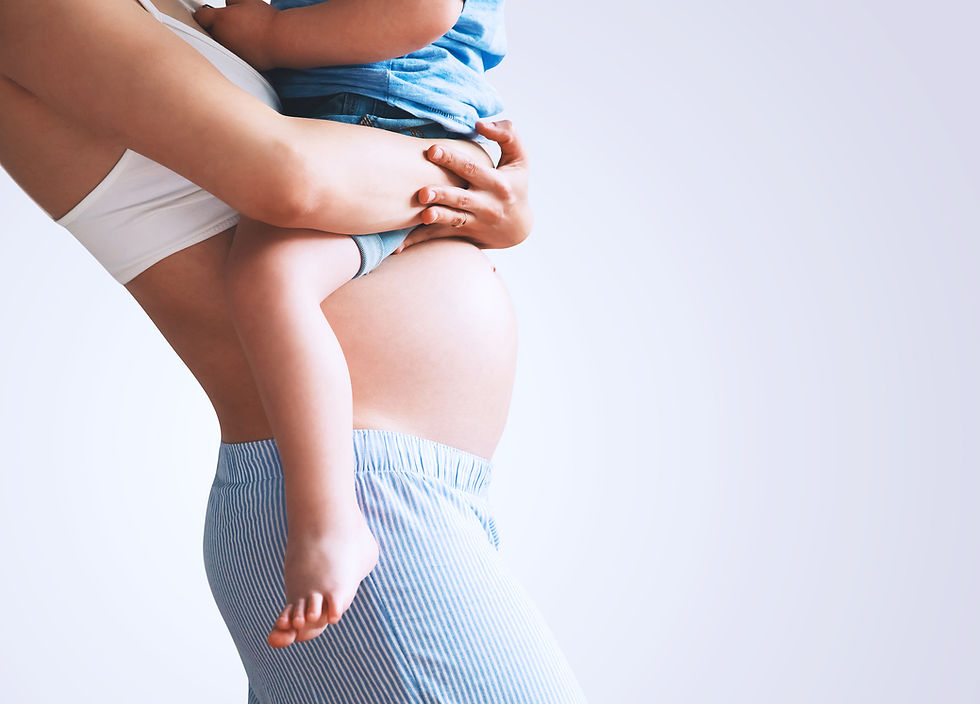Sibling Rivalry Series Part 1: Preparing Your Toddler BEFORE baby arrives
- Love Parenting UAE
- Sep 20, 2018
- 6 min read
One of the most common questions we get from parents of toddlers is how to cope with the arrival of a new sibling. In this new series, we will offer some suggestions on how to prepare your little prince or princess in advance, how to help a toddler adjust after baby arrives, and some general tips for preventing (or at least reducing) sibling conflicts in the long run.

The first thing we all need to acknowledge, is that the arrival of a new baby is stressful for everyone, and especially stressful for a child whose cognitive development still is quite immature. It is totally normal for a toddler to react to the arrival of a new sibling in any number of ways--and often in more than one way, depending on the day. All parents should expect their toddler to go through some changes in their behavior and in needs. Regressions are normal and not something that need to cause a lot of concern. Increased tantrums or power struggles are normal as well. Even before baby arrives, toddlers can sense that something is different. Mum may be more tired, more ill, less able to run around and do the things she used to do. Mum and dad will be both excited and anxious about the imminent arrival--all of which a toddler will sense and respond to in unique ways.
While we live in a region where it is culturally the norm for some people to have more than one wife, many of us are expats who do not come from this same culture. Try to imagine that your spouse says to you, " I love you so much, you make me so happy and now I have great news! I am going to get another wife/husband and I will love her/him just as much and so will you! AND you will get to help "take care" of them and help them settle in and feel like part of the family". Would you be all excitement and gratitude do you think? Or might you have some issues to work through first? Your toddler probably was not involved in this decision to bring a new family member in, so they will undoubtably need some help in coming to terms with this big change.
Below you will find our tips for helping your toddler start to adjust BEFORE the new baby arrives.

1. Think about when to tell your child. Too early may be confusing to young children, too late means they are left out and may hear about it from someone else. Even young children will sense that something is going on, so don’t try to keep it a secret for long. In general, if you are telling friends about the baby, tell your toddler as well.
2. Talk about becoming a big brother/sister. Accentuate the positives by telling your child that she'll have someone new to love. Explain that this baby will be her little sister or brother, so she'll perceive having a sibling as a privilege or gift. But don’t overdo it and set up a competitive feeling with this new “wonderful” person who is in mummy’s belly. Talk also about how much more your toddler will be able to do and all the things she will teach the baby, and how much the baby will love her.
3. Depict the baby as a real person with his own needs and interests. For example, explain that babies need milk and diapers and that they sleep a lot. Research shows that parents who talk openly to their children before the new baby and who explain that he or she is a real person tend to have kids who get along better.
4. Involve your toddler in the pregnancy. Bring toddler along to antenatal check-ups so she can hear the heartbeat, see baby on ultrasound, and be part of the experience. Let her participate in preparations at home also. Let her choose the baby’s coming home outfit from two acceptable options, or let her help prepare a bed or room for baby, or even help choose a name.
5. Set realistic expectations. Give your toddler a realistic idea of what to expect when the baby first arrives. You will be tired, and the baby will take lots of your time. The baby will not be able to do much at first, except eat, sleep, poop, pee and cry. The baby will not be a playmate for some time. If possible, visit friends with a new baby so your child can see what it will be like.
6, Find some good books for toddlers. Read books about pregnancy, birth, newborns, and baby siblings with your child. Give him a chance to ask questions, voice concerns, and vent any and all feelings inspired by the books. Don’t dismiss any feelings, even if they are negative. Let him know that it is normal to have positive and negative feelings about having a new baby. (Be prepared for him or her to also want to know where babies come from, how they get out, and how they got in there in the first place--you might want to make sure you have a good book on this part of the process too.)
7. Practice with a doll or stuffed animal. Have your child practice holding a “baby” and supporting the head. Teach him how to touch and hold a baby very gently. You can even help them put nappies on, give a bath, wear it in a child-sized sling or push it in a doll-sized carriage or stroller and care for their “baby” in other ways.
8. Remind your toddler that she was also a baby once. Look at pictures/video of your older child’s birth and babyhood. Tell her about her birth and what she was like as a baby. Tell her how excited you were when she were born, and how everyone wanted to see her and hold her. Children LOVE stories about themselves and about how you cared and sacrificed for them.
9. Encourage peer friendships. Studies show that children who have at least one close friend before their sibling is born have better relationships with their new brother or sister. Schedule some play dates, ideally with a mum with whom you also enjoy spending time. If she is expecting a new baby as well, all the better!
10. Don't blame your belly. While you're pregnant, your growing midsection may be the reason you can't get down on the floor for block building or a tea party with your toddler. But don't tell him that. He may think it's the baby's fault, and resentment may build before your little one is even born.

My own toddler, about a week before her sister was born
11. Make the most of your final months with THIS child. Don’t think that pushing your toddler away will make her need you any less after baby comes. Enjoy the intense connection you have now, so that she will have that security later. Encourage a great relationship with Daddy as well, as he will likely take over much more of the toddler care after the baby arrives.
12. Plan ahead for changes in your toddler’s life. If possible make any changes in your toddler’s sleeping arrangements, weaning from the breast, potty training, starting nursery, etc. well before baby arrives so the toddler doesn’t feel displaced BY the baby or because of the baby.
13. Prepare for the separation from mum. Prepare carefully for the toddler’s care while you are at the hospital having the baby. This can be the most traumatic time for them. Make sure he knows what will happen, who will look after him, and that he can phone you and come see you in the hospital, and that you will come home with the baby before too long.
14. Consider having your toddler present at the birth. Where possible, toddlers may be able to attend the birth, but only with a full-time, familiar caregiver who is just there for the toddler and is willing to leave the room if that is what toddler needs. In places where this is possible there are sometimes sibling classes that you and your child can attend to prepare for the birth.
What have you found to be helpful in preparing your child or children for a new sibling? What was your experience of adding a new family member? What might you do differently if you had it to do over?
For more information and strategies for keeping life with your toddler as calm as possible during the challenging time, I teach a ToddlerCalming Workshop with lots of science-based, gentle parenting strategies that many families have found helpful.
Amy x























































Comments